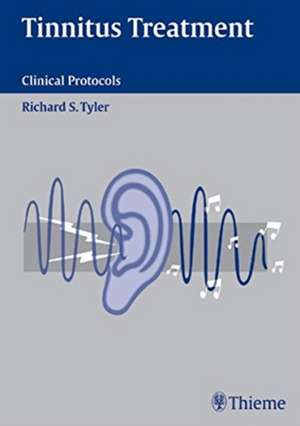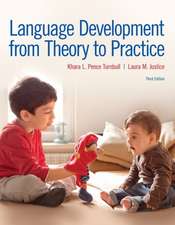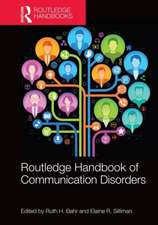Tinnitus Treatment: Clinical Protocols
Editat de Richard Tyleren Limba Engleză Hardback – 6 dec 2005
Most clinicians have little experience with tinnitus treatments, and are unsure of how to help a patient suffering from the condition. Filling a significant gap in literature, this book offers a variety of in-depth protocols to treat tinnitus. Beginning with a review of several neurophysiological and psychological models of tinnitus, the book goes on to cover evaluation tools; counseling options and methods; treatment with hearing aids, wearable and non-wearable noise generators, and music; tinnitus-related insomnia; quality-of-life issues; and much more. Highly experienced clinicians give you the practical strategies to apply such therapeutic modalities as cognitive-behavioral therapy, individual and group sessions, sound therapy, habituation therapy, and narrative therapy. You will also find sample handouts to allow for effective communication with patients. With key clinical information for implementing all current therapies, this text is an essential professional tool for audiologists, psychologists, and other practitioners involved in managing otologic disorders.
Richard Tyler, PhD, is a professor in the Department of Otolaryngology-Head Neck Surgery and in the Department of Speech Pathology and Audiology at the University of Iowa. Tyler and Sergei Kochkin, PhD recently sat down to talk about the results of a survey they conducted about tinnitus treatment and the effectiveness of hearing aids, which was published in the December 2008 edition of The Hearing Review. Click here to learn more and to watch a podcast that examines the survey results: http://www.hearingreview.com/podcast/files/ST20081218.asp.
Richard Tyler, PhD, is a professor in the Department of Otolaryngology-Head Neck Surgery and in the Department of Speech Pathology and Audiology at the University of Iowa. Tyler and Sergei Kochkin, PhD recently sat down to talk about the results of a survey they conducted about tinnitus treatment and the effectiveness of hearing aids, which was published in the December 2008 edition of The Hearing Review. Click here to learn more and to watch a podcast that examines the survey results: http://www.hearingreview.com/podcast/files/ST20081218.asp.
Preț: 284.08 lei
Preț vechi: 299.03 lei
-5% Nou
Puncte Express: 426
Preț estimativ în valută:
54.37€ • 56.55$ • 44.88£
54.37€ • 56.55$ • 44.88£
Carte tipărită la comandă
Livrare economică 14-28 aprilie
Preluare comenzi: 021 569.72.76
Specificații
ISBN-13: 9781588901811
ISBN-10: 1588901815
Pagini: 272
Ilustrații: 42
Dimensiuni: 178 x 254 x 17 mm
Greutate: 0.59 kg
Ediția:1st edition
Editura: Thieme
Colecția Thieme
ISBN-10: 1588901815
Pagini: 272
Ilustrații: 42
Dimensiuni: 178 x 254 x 17 mm
Greutate: 0.59 kg
Ediția:1st edition
Editura: Thieme
Colecția Thieme
Recenzii
This text is a wonderful summary of the current state of the art of current audiologic and psychological interventions for tinnitus. It provides an excellent overview of the prevailing theories and pathophysiologic mechanism regarding tinnitus and provides detailed updates on the different therapeutic approaches...The value of the book is some detailed understanding of the psychological approaches to tinnitus management...This book would be a useful reference for any clinician managing tinnitus patients.--Otology & NeurotologyHighly recommend[ed]...to any clinician with a desire to establish a successful tinnitus management clinic.--Australian Journal of Audiology
Notă biografică
Professor, Director of Audiology, Department of Otolaryngology, University of Iowa Hospitals & Clinics, Iowa City, IA, USA
Textul de pe ultima copertă
Most clinicians have little experience with tinnitus treatments, and are unsure of how to help a patient suffering from the condition. Filling a significant gap in literature, this book offers a variety of in-depth protocols to treat tinnitus. Beginning with a review of several neurophysiological and psychological models of tinnitus, the book goes on to cover evaluation tools; counseling options and methods; treatment with hearing aids, wearable and non-wearable noise generators, and music; tinnitus-related insomnia; quality-of-life issues; and much more. Highly experienced clinicians give you the practical strategies to apply such therapeutic modalities as cognitive-behavioral therapy, individual and group sessions, sound therapy, habituation therapy, and narrative therapy. You will also find sample handouts to allow for effective communication with patients. With key clinical information for implementing all current therapies, this text is an essential professional tool for audiologists, psychologists, and other practitioners involved in managing otologic disorders.
Richard Tyler, PhD, is a professor in the Department of Otolaryngology-Head Neck Surgery and in the Department of Speech Pathology and Audiology at the University of Iowa. Tyler and Sergei Kochkin, PhD recently sat down to talk about the results of a survey they conducted about tinnitus treatment and the effectiveness of hearing aids, which was published in the December 2008 edition of The Hearing Review. Click here to learn more and to watch a podcast that examines the survey results: http://www.hearingreview.com/podcast/files/ST20081218.asp.
Richard Tyler, PhD, is a professor in the Department of Otolaryngology-Head Neck Surgery and in the Department of Speech Pathology and Audiology at the University of Iowa. Tyler and Sergei Kochkin, PhD recently sat down to talk about the results of a survey they conducted about tinnitus treatment and the effectiveness of hearing aids, which was published in the December 2008 edition of The Hearing Review. Click here to learn more and to watch a podcast that examines the survey results: http://www.hearingreview.com/podcast/files/ST20081218.asp.
Descriere
This book offers a variety of in-depth protocols to treat tinnitus. Beginning with a review of several neurophysiological and psychological models of tinnitus, the book goes on to cover evaluation tools; counseling options and methods; treatment with hearing aids, wearable and non-wearable noise generators, and music; tinnitus-related insomnia; quality-of-life issues; and much more. Highly experienced clinicians give you the practical strategies to apply such therapeutic modalities as cognitive-behavioral therapy, individual and group sessions, sound therapy, habituation therapy, and narrative therapy.




